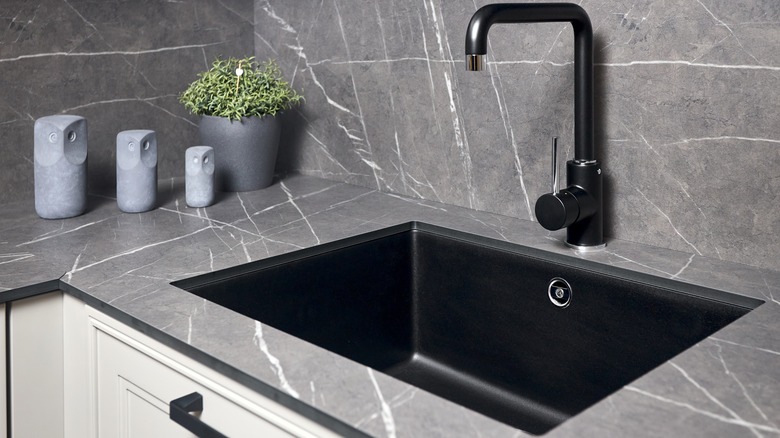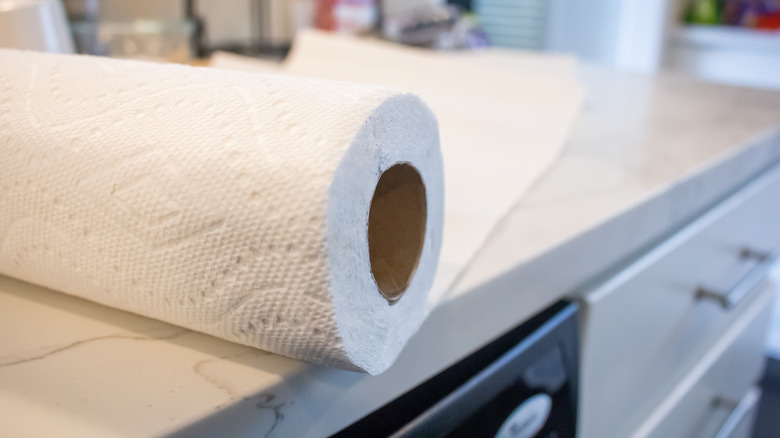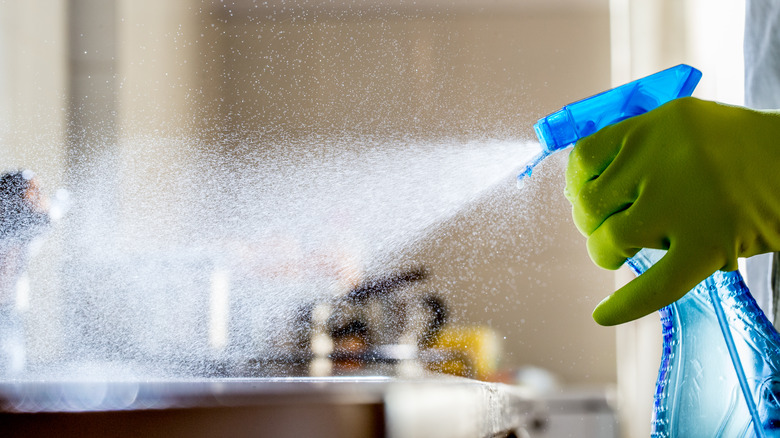Avoid Using This Common Cleaner On Laminate Countertops At All Costs
When it comes to cleaning, bleach is often a common go-to in many households. For decades, it has been a reliable and powerful disinfectant that can tackle bacteria, viruses, and mold. For both the kitchen and the bathroom, the smell of bleach has almost become synonymous with cleanliness. Add in the fact that it's relatively inexpensive and widely available a variety of stores and it's often a convenient choice for many households. Beyond cleaning, it's also useful with other chores like removing stains from clothing or brightening the shine of your white linens. That all being said, bleach's powerful cleaning properties are sometimes too strong for certain surfaces, laminate countertops in particular.
While diluted bleach can be safe on many surfaces, you should stick to a more mild cleaning agent for any laminate counters you have in your home. Since they are composed of layers of plastic resin, laminate counters are subject to discoloration, warping, or even delamination if exposed to bleach. Moreover, bleach can also strip the protective coating that usually covers the top layer of these countertops, which would leave your counters vulnerable to damage, scratches, and stains. As laminate counters are often a relic of the 1940s to 60s, their age may already make them susceptible to harsh cleaners like bleach, so continuing to use a strong product like this can cause noticeable changes to their appearance, such as fading or yellowing. Consequently, it's a good idea to choose a more gentle product to clean laminate countertops.
What to do if you get bleach on your laminate countertops
Even if you never use bleach to clean your laminate countertops, accidents can happen. For whatever reason, if you unintentionally spill bleach on your laminate countertops, it's important to act quickly to protect your counters and prevent the bleach from wreaking havoc. Most significantly, it's essential to immediately wipe up any bleach from the counters with a clean, damp cloth. Be sure to wear gloves as well in order to protect your skin from the harsh chemical. Bleach can burn bare skin, so it's important to avoid coming in direct contact with the liquid, even if diluted.
After you wipe up all of the spilled bleach, thoroughly rinse your countertops with water to help dilute any remaining bleach and prevent it from reacting with the laminate. You can use a fresh, damp cloth to wipe down the counters a few times to be sure that you've removed any remaining bleach residue. After drying your countertops, assess any damage. If you notice any minor discoloration or stains on the laminate, you can try to use a baking soda paste or a mixture of vinegar and water to help neutralize any bleach and restore your counter's color. Gently scrub the area and then rinse and dry completely. If you notice damage like warping or delamination, you will likely need to consult a professional countertop repair service for recommended solutions such as refinishing or replacing the affected area.
Safely cleaning laminate countertops
The safest and most effective way to clean laminate countertops may also be the most simple and readily available. All you need is a mild dish soap solution. Unlike bleach, which is too powerful for the delicate nature of laminate, dish soap is gentle yet effective at cutting through dirt, grease, and stains without risking any damage to your countertops. Moreover, most households also have dish soap on hand, making it an easy and convenient choice for cleaning your counters.
To clean your counters with dish soap, you'll need to mix a small amount of the soap with warm water in either a bucket or a spray bottle. Aim for a mild concentration to avoid leaving behind a soap residue. Using a damp cloth or sponge, gently wipe down the surface of the counters with the cleaning solution. Pay attention to any areas with spills, stains, or grime. While cloths and sponges are generally safe for laminate, abrasive scrubbers or tools are not as they can chip or scratch the soft texture of the laminate. Stick to gentler cleaning tools to preserve the integrity of your countertops.
After you've used the soapy water solution, rinse the counters with clean water to remove any residue and then dry them completely with a clean, dry cloth to prevent any film from forming along the surface. Choosing this method over bleach is a great way to preserve the structure and aesthetic of your laminate countertops without risking any damage.


